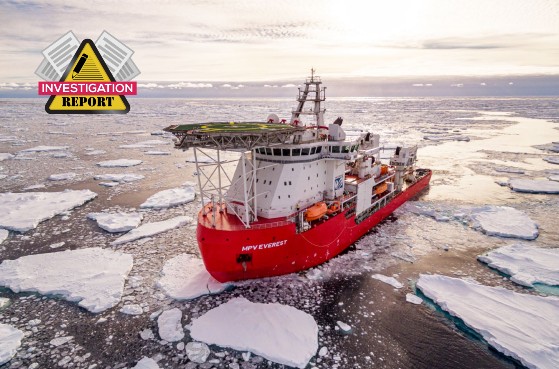The Australian Transport Safety Bureau (ATSB) published the investigation report of the Bahamas-registered, 145m multi-purpose vessel MPV Everest in which, on 5 April 2021, a fire broke out in the port engine room while en route from Mawson Station, Antarctica to Hobart, Tasmania with 37 crew and 72 Australian Antarctic Division staff on board.
The incident
The ship’s crew responded, and the fire was contained and eventually extinguished using the engine room water mist fixed fire-extinguishing system about 2.5 hours later. The port engine room sustained substantial damage with most of the power generation equipment and machinery located within rendered inoperable. There were no reported injuries or pollution of the sea as a result of the fire. Power and propulsion were subsequently restored using the starboard engine room’s machinery and the ship diverted to Fremantle, Western Australia, where it arrived without further incident about a week later.
This analysis will consider the factors and circumstances leading up to the uncontrolled overflow of fuel oil in the ship’s engine room, the fire mechanism, the effectiveness of the shipboard response and general emergency preparedness on board. The analysis will also consider elements of the ship’s design, the effectiveness of MPV Everest’s safety management system (SMS), the extent to which the ship and its crew were prepared for Antarctic operations and the effectiveness of the Australian Antarctic Division’s (AAD) pre-charter due diligence and risk management arrangements.
#1 Fuel oil overflow
On the morning of the fire, the chief engineer manually initiated a routine fuel oil transfer from a storage tank to the port settling tank using the integrated automation system (IAS) in the ship’s engine control room (ECR) to start the diesel transfer pump. The chief engineer then left the ECR to carry out repairs to a diesel generator in the starboard engine room.
#2 Manual fuel transfer
Fuel oil transfers on board MPV Everest could be conducted manually or automatically. In the automated transfer mode, the IAS would initiate the fuel oil transfer when fuel levels in the settling tank dropped to 50% of tank capacity or below. The system would then automatically stop the transfer pump thereby ceasing the filling of the tank when fuel levels reached 80% of tank capacity. The automated transfer and its associated safety mechanisms were verified to be
operating correctly and fuel transfers had been conducted safely in the past using the automatic transfer mode.
#3 Design of port fuel oil settling tank air pipe
The main objective of the International Convention for the Safety of Life at Sea (SOLAS) is to specify minimum standards for the construction, equipment and operation of ships to ensure an adequate level of safety. In meeting these objectives, SOLAS included regulations aimed at controlling the leaks of flammable liquids, limiting the accumulation of flammable vapours and preventing the ignition of combustible materials or flammable liquids. Flag States are responsible for ensuring that ships under their flag comply with the requirements of the Convention. In practice, this is achieved by designing, constructing and maintaining ships in compliance with the requirements of a classification society recognized by the flag State. MPV Everest was classed with Bureau Veritas (BV) and the Russian Maritime Register of Shipping (RMRS) under a working arrangement, with BV responsible for design plan approval and survey at the shipyard of the ship’s hull and piping systems, among others.
#4 Port fuel oil drain tank air pipe
The port fuel oil drain tank, and its air pipe on the main deck, were mandated measures aimed at mitigating the risk of overfilling and over pressurisation of the port settling tank. However, in this case, the drain tank filled with fuel overflowing from the settling tank, followed by the fuel level in the settling tank increasing past the tank’s maximum capacity and overflowing into the ventilation casing and engine room.
#5 Ignition
The first indications of a fire on board MPV Everest were the sighting of flames issuing from the ventilation louvres of the port engine room’s exhaust ventilation casing. Following this initial deflagration, eyewitness accounts and mobile phone footage showed a brief lull during which there was smoke issuing from the louvres while watercraft and other equipment located just outside the louvres burned. This was followed by the activation of fire detectors on B-Deck in the port engine room and a further deflagration event with flames once again emanating from the louvres.
Finally, in considering the circumstances of this accident, it is important to recognise that the impact of the COVID-19 pandemic and associated restrictions on the maritime industry was significant. Seafarers shouldered a heavy burden during the pandemic in maintaining global trade and sustaining operations that required maritime capabilities. Disruptions to travel and quarantine measures adversely affected the ability to relieve crews and effect crew changes in a timely
manner leading to uncertainty and extended time served on board, while restrictions on shore leave forced seafarers to remain on board in port. These factors, along with the general operational hazards of seafaring, particularly in the Southern Ocean and Antarctica, all played a part in creating a stressful environment and increasing the risk of fatigue for all those on board MPV Everest.
ATSB investigation report findings focus on safety factors (that is, events and conditions that increase risk). Safety factors include ‘contributing factors’ and ‘other factors that increased risk’ (that is, factors that did not meet the definition of a contributing factor for this occurrence but were still considered important to include in the report for the purpose of increasing awareness and enhancing safety). In addition ‘other findings’ may be included to provide important
information about topics other than safety factors.
Safety issues are highlighted in bold to emphasise their importance. A safety issue is a safety factor that (a) can reasonably be regarded as having the potential to adversely affect the safety of future operations, and (b) is a characteristic of an organisation or a system, rather than a characteristic of a specific individual, or characteristic of an operating environment at a specific point in time. These findings should not be read as apportioning blame or liability to any particular
organisation or individual.
Actions
Central to the ATSB’s investigation of transport safety matters is the early identification of safety issues. The ATSB expects relevant organisations will address all safety issues an investigation identifies. Depending on the level of risk of a safety issue, the extent of corrective action taken by the relevant organisation(s), or the desirability of directing a broad safety message to the marine industry, the ATSB may issue a formal safety recommendation or safety advisory notice as part
of the final report. All of the directly involved parties were provided with a draft report and invited to provide submissions. As part of that process, each organisation was asked to communicate what safety actions, if any, they had carried out or were planning to carry out in relation to each safety issue relevant to their organisation. The initial public version of these safety issues and actions are provided separately on the ATSB website, to facilitate monitoring by interested parties. Where relevant, the safety issues and actions will be updated on the ATSB website as further information about safety action comes to hand.




































































